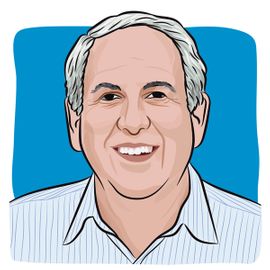- About Us
- Advertise / Support
- Editorial Board
- Contact Us
- CancerNetwork.com
- TargetedOnc.com
- OncLive.com
- OncNursingNews.com
- Terms & Conditions
- Privacy
- Do Not Sell My Information
- Washington My Health My Data
© 2025 MJH Life Sciences™ and CURE - Oncology & Cancer News for Patients & Caregivers. All rights reserved.
Standing Up to Cancer is Far More Than Slogans

William Ramshaw resides in the expansive Pacific Northwest. He is a six-year survivor of pancreatic cancer and has written a memoir Gut Punched! Facing Pancreatic Cancer.
As a 12-year pancreatic cancer survivor, I share my journey through diagnosis, treatment and survival, hoping my story inspires others to act beyond slogans.
Over the years, I don’t know how many cancer slogans I’ve heard. Likely hundreds. It has gotten to the point where they all seem to sound “sing-songy.” Ones like “Together We Can Beat Cancer,” “Don’t Lose Hope,” “Stay Strong,” and “Cancer Is a Word, Not a Sentence” may inspire us, but they do little more. Standing up to cancer requires far more. It requires action.
For me, standing up to cancer is an evolving story. Back in 2013, I felt beyond sick to my stomach. The mere sight of food made me lose it literally. A trip to my doctor led to an emergency CT scan. The scan showed I had a blocked bile duct (whatever that is). After nine long hours of waiting in the ER, I was admitted. Early the next morning, I was scoped, and a stent was inserted into my bile duct to open it. A probe is inserted through the mouth down into the stomach to examine the upper digestive system. Over the next couple of days, with a functioning digestive system I began to feel a bit better until the doctor who scoped me dropped by to see me.
Leaning over the rail of my hospital bed, much like a mechanic telling you your transmission is out and it will be thousands of dollars you don’t have, looking away, he said, “During your scoping, I took a small scraping. I am sorry you have a malignancy.” Before I could muster a single question, he spun around and hurried out the door. While I thought “malignancy” meant “cancer,” even with two master’s degrees, I wasn’t sure. (I found nothing comforting about a doctor being unable to use the “C” word.) It took two more weeks in the hospital before another doctor used an ultrasound probe to locate an evasive one-inch pancreatic tumor, which was squeezed up next to my bile duct. Thus, my story began.
Over the course of the next six months, I had a Whipple procedure to extract my pancreatic tumor. Not to be graphic, but with our pancreases buried deep within us, it’s much like gutting a fish. This was followed by weeks of radiation, then weeks more of chemo.
Being told, “I’m sorry you have cancer,” is perhaps the worst thing anyone can hear. Nonetheless, this is eclipsed by being told, “I’m sorry you have pancreatic cancer.” Often found too late to treat, it has an abysmal two-year survival rate and a mere 13% five-year survival rate. Sadly, many consider pancreatic cancer to be a death sentence. The American Cancer Society estimates each year more than 65,000 people will be told they have it, with a vast majority of those not seeing two years.
Famous or a nobody, a community figure or a complete unknown, rich or in destitute poverty, it doesn’t matter. Well-known names like Alex Trebek of “Jeopardy!” fame, Steve Jobs of Apple, Supreme Court Justice Ruth Bader Ginsburg, singer Aretha Franklin, astronaut Sally Ride, actors Patrick Swayze and Michael Landon fought against it and lost. There are so many more well-known people who succumbed to it. So many, in fact, there are websites out there to memorialize them.
Thus, being a 12-year pancreatic cancer survivor, I am considered a unicorn. One day, a nurse practitioner who cared for me said, “You’re a real miracle boy!” Given this, one of the ways I have chosen to stand up to cancer is by writing about it. If I can survive a cancer that kills nearly everyone who gets it, I hope my story will inspire others to stay in the fight and not give up, no matter how dire it looks for them.
So I would ask, “What does standing up to cancer mean to you?” There are so many ways to stand up. What action can you take? Offering a few kind words to someone in the heat of treatment, volunteering at a charity event, even giving a ride to someone who is in treatment, or watching their kids while they are getting their chemo are but a few of the ways to take action.
Talk about your cancer journey. If so inclined, write about it. Do something. Small things matter. You will feel better, and who knows who you might inspire to try yet another new treatment or jump into a clinical trial. Stand up to cancer. Perhaps if more of us do, we can put an end to this scourge.
This piece reflects the author’s personal experience and perspective. For medical advice, please consult your health care provider.
For more news on cancer updates, research and education, don’t forget to subscribe to CURE®’s newsletters here.
Related Content:



